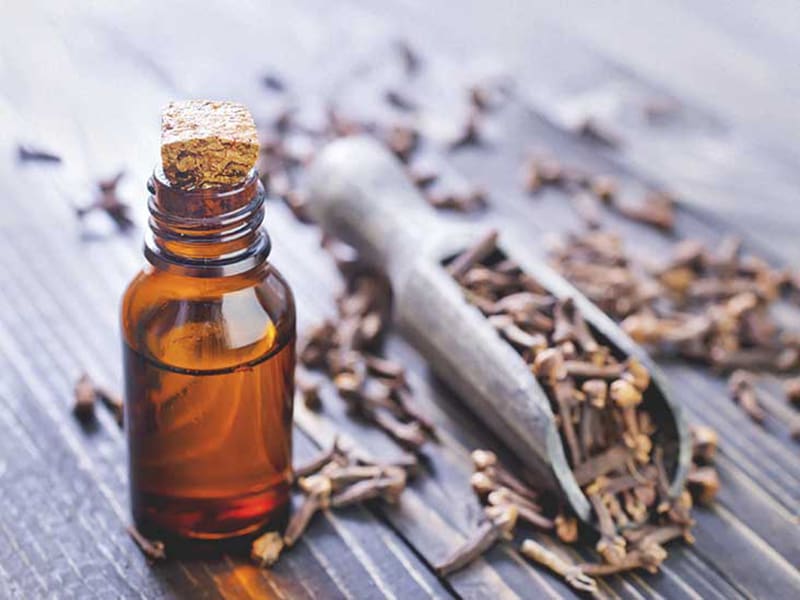The health benefits of clove oil can be attributed to its antimicrobial, anti-fungal, antiseptic, antiviral, aphrodisiac and stimulating properties. This oil is used for treating a variety of health issues including skin issues, toothaches, indigestion, cough, asthma, headache, stress and blood impurities. The most important and common use of clove oil is in dental care. Several toothpastes, mouthwashes, and oral care medications contain clove oil as an important ingredient.n C.
Clove is an evergreen tree, which produces a flower bud that has numerous medicinal properties. It is often referred to as clove bud. It has a shaft and a head and hence, has the Latin name clavus, meaning nail. Clove was extensively used in ancient Indian and Chinese civilizations and it spread to other parts of the world, including Europe, during the seventh and eighth centuries. Even now, clove is used widely in several Indian and Chinese cuisines.
Clove is rich in minerals such as calcium, hydrochloric acid, iron, phosphorus, sodium, potassium, and vitamin A and vitamin C.
Health Benefits
Boosts Immunity
Treats Respiratory Problems
Relieves Earaches
Treats Infections
Dental Care
The most prominent use of clove oil is in dental care. The germicidal properties of the oil make it very effective for relieving dental pain, toothache, sore gums and mouth ulcers. It contains eugenol, which has been used in dentistry for many years. Gargling with diluted clove oil helps in easing throat pain and irritation. The characteristic smell of clove oil also helps to eliminate bad breath. Clove is also effective against cavities, and traditionally, in India, every day before going to sleep, clove oil was added to a small cotton ball and put at the end of the tooth which has a cavity. The cavity would vanish in a few days. As a result, clove oil is added to numerous dental products and medications, including mouthwash and toothpaste. Dentists also mix clove oil with zinc oxide to prepare a white, filling material as a temporary alternative to a root canal. But be careful, it is very strong and can cause burns in your mouth if used incorrectly.
Recent studies and careful consideration of the power of clove oil have resulted in it being used as a soothing balm on infants who are teething. It can be applied to a baby’s gums in extremely diluted form as the antiseptic and soothing qualities of the oil can ease their pain and reduce the discomfort.
How to use clove oil for toothache?
Grab a cotton ball and dab on a bit of the clove oil. Then, hold it against the tooth that is hurting. Within a few minutes, the tooth will be numb. The effect of clove oil on a toothache is almost immediate, and it is very simple to do. The anti-inflammatory and analgesic nature of clove oil makes it an excellent topical agent, and it can also help reduce infection and protect the immune system at the same time.
Skin Care
Lowers Stress
Eliminates Headache
Treats Sty
Treats Indigestion
Reduces Nausea
Increases Blood Circulation
Purifies Blood
Prevents Premature Ejaculation
Treats Cholera
Controls Diabetes
Cancer Treatment / Preventative
Insect Repellent
Cancer Treatment / Preventative
Other Uses
Insect Repellent: Clove oil is commonly used as a component in bug repellent and insect-repelling candles because the vapor is very potent for the olfactory senses of many insects. Traditionally, a few drops of clove oil were placed on the bedsheets at night to keep bugs away.
Cosmetics: Clove oil is often added in cosmetic creams and lotions, and it is commonly known as a good massage oil that provides relief from pain and stress.
Cigarettes: Usage of clove in making cigarettes is a new trend all over the world, although traditionally, clove was added to cigarettes in Indonesia. Smokers incorrectly feel that the numerous health benefits of clove would nullify the ill effects of smoking, whereas the natural elements in clove cigarettes only reduce the harmful impacts, but smoking clove cigarettes can still be carcinogenic.
Flavoring Agent: Along with trying to benefit from cloves’ digestive properties, the essential oil is also added to fooditems due to its rich flavor. It is added in a multitude of Indian dishes, pickles, sauces, spice cakes, and many cultural foods.
Soap: Due to its powerful aroma, soothing effect and antiseptic properties, clove oil is often added as an active ingredient while making soaps.
Perfumes: Clove oil is also used in making perfumes because of its powerful and unique aroma.
Aromatherapy: Clove oil blends well with many essential oils including basil essential oil, rosemary essential oil, rose oil, cinnamon essential oil, grapefruit essential oil, lemon essential oil, nutmeg essential oil, peppermint essential oil, orange essential oil, lavender essential oil, geranium essential oil. This makes clove oil a popular element in aromatherapy and other herbal combinations.
A Word of Caution
One should be careful while using clove oil because it is very strong even in small quantities and must be diluted before application or ingestion. Since eugenol (the main part of clove essential oil) is not very common, some people discover violent allergies when taking too much at once. Use small amounts of any essential oil if you have never used it before.
Furthermore, preliminary risks of clove oil include some intestinal discomfort, which is most common in children, and in the most serious cases, has even been connected to kidney and liver failure. Clove oil can cause blood sugar to drop, so diabetics should be cautious, pregnant women and those who are nursing should not use clove oil, as it is not clear whether this strong compound passes to the infant in the breast milk. As with any change to diet or nutritional supplement, it is best to consult a doctor before administering or adding to your daily or weekly regimen.

